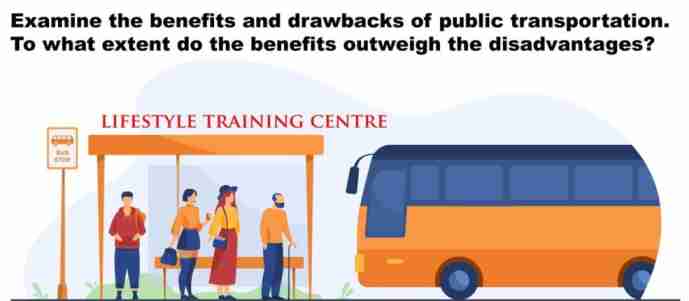Duolingo / PTE / IELTS outweigh essay

Model answer 1 by Lifestyle Training Centre
In a world marked by rising population, increasing fuel cost, traffic congestion, and intense competition, the reliance on public transportation is a subject open to debate. While choosing public transportation may have occasional drawbacks, I firmly believe that the benefits far outweigh the disadvantages.
On the one hand, with the rapid increase in the number of vehicles on the roads, it is crucial for people to consider opting for public transportation, such as trains, metros, and government buses. This not only aids in reducing the escalating fuel costs but also significantly diminishes the emission of carbon dioxide. Fewer private vehicles on the road translate to less pollution. In addition, if more individuals rely on public transportation for commuting from point A to B, it becomes decisive in mitigating the irksome issue of traffic congestion. Bangalore, one of the eminent metropolitan cities of Karnataka, recently was able to curb to a great extend their ever-increasing issue of traffic congestion by promoting their metros and allowing concessions for students.
On the other hand, public transportation, while promising, is not without its own challenges. Firstly, it may not always be a dependable option, particularly during emergencies. The fixed schedules and intervals of these modes of transportation can limit their availability when urgent needs arise. Moreover, relying on public transportation involves sacrificing a degree of privacy, unlike the personalized space provided by private vehicles. Factors such as overcrowding and potential delays further emphasise the constraints of relying solely on these services. Nevertheless, adept time management can seemingly help overcome these limitations. Commuting through these modes also provides opportunities for socializing and alleviates the challenges associated with navigating through traffic while driving.
In conclusion, while relying on public transportation may present occasional challenges, the associated advantages far outweigh these difficulties. As responsible individuals, we should strive to preserve our environment and enhance the overall quality of life. Choosing public transportation over personal vehicles is a significant step toward achieving these goals.
Model answer 2 by Lifestyle Training Centre
Public transportation presents both advantages and disadvantages. However, upon careful consideration, the benefits of public transportation significantly outweigh the drawbacks.
First and foremost, public transportation is environmentally friendly. It reduces the number of private vehicles on the road, thus lowering emissions and decreasing air pollution. This contributes to improved air quality and helps combat climate change. Secondly, public transportation is cost-effective for both individuals and governments. It reduces the need for personal vehicles, leading to less spending on car purchase, maintenance, and fuel. For governments, public transportation investments can be more efficient and sustainable in the long term than expanding road networks. Thirdly, public transportation promotes community well-being. It increases social inclusion by providing accessible transport options for those who cannot afford or operate private vehicles. Public transit systems connect people to education, jobs, healthcare, and social activities, enhancing their quality of life.
On the other hand, public transportation does have its drawbacks. Some argue that it can be less convenient and less flexible than personal vehicles. Fixed schedules and routes may not suit everyone’s individual needs or preferences. Furthermore, overcrowding and delays can be frustrating for commuters. In busy urban areas, public transportation systems may become congested during peak hours, leading to discomfort and inconvenience for passengers.
In conclusion, the benefits of public transportation significantly outweigh the disadvantages. It plays a crucial role in reducing environmental impact, offers a cost-effective alternative to personal vehicles, and enhances community well-being. While challenges like convenience and overcrowding exist, they can be mitigated through improvements in public transportation infrastructure and services. Public transportation remains a sustainable and socially responsible mode of travel that benefits both individuals and societies at large.
IELTS Speaking Task Topics
Click on any topic to explore more!
Names

Learn about the importance of names and their cultural significance.
Study / Job

Discuss various aspects of studying and working in different fields.
Hometown

Explore the charm of your hometown and its unique features.
Accomodation

Understand various types of accommodation and living situations.
Weather

Learn about how weather influences daily life and activities.
Time

Discuss the concept of time, its importance, and time management.
Television

Talk about the role of television in modern entertainment.
Museum

Discuss the cultural importance of museums and historical exhibits.
Holidays

Explore the significance of holidays and different celebrations.
Films

Learn about the impact of films on culture and society.
Leisure Time

Discuss how leisure activities impact personal well-being.
Sport

Talk about the role of sports in health, entertainment, and culture.
Vegetables and Fruits

Discuss the health benefits and importance of fresh produce.
Maths

Explore the role of mathematics in various aspects of life.
Sky

Discuss the beauty and scientific significance of the sky.
Clothes&Fashion

Explore how clothing reflects culture and personal expression.
Weekend

Discuss the importance of weekends and ways people relax.
Reading

Learn about the importance of reading and various reading habits.
Sleep

Explore how sleep impacts physical and mental well-being.
Trees&Plants

Discuss the environmental and health benefits of plants.
Newspaper

Discuss the evolving role of newspapers in the digital age.
Texting

Explore the role of text messaging in modern communication.
Memorising

Learn techniques for improving memory and memorization.
Travelling

Discuss the importance and impact of traveling in modern society.
Communication

Explore the modes and significance of communicating well
Letter&Email

Explore the differences and significance of letters vs. emails.
Swimming

Discuss the benefits of swimming for health and fitness.
Snacks

Explore the role of snacks in daily nutrition and lifestyle.
Photography

Discuss photography’s cultural and artistic significance.
Help

Talk about the importance of offering and receiving help.
History

Discuss historical events and their impact on modern society.
Handwriting

Explore the significance of handwriting in education and culture.
Music

Learn about the influence of music on emotions and society.
Colours

Discuss how colours affect perception and mood.
Teachers

Explore the role of teachers in shaping students’ futures.
Being Alone

Talk about the experience and benefits of spending time alone.
Teamwork

Learn the importance of teamwork in professional and social contexts.
Countryside & City

Explore the charm and benefits of living in the countryside.
Social Media

Discuss the impact of social media on society and relationships.
Friends

Explore the importance of friendships in life.
Artificial Intelligence (AI)

Talk about the future of AI and its role in society.
Climate Change

Discuss the causes and consequences of climate change.
Transportation

Explore different modes of transportation in your area.
Sustainable Transportation

Explore ways to make transportation more environmentally friendly.
Space Exploration

Learn about the latest advancements in space exploration.
Shopping

Explore how shopping influences culture and the economy.
Modern Technology

Discuss how modern technology is reshaping society.
Technology

Learn about the role of technology in everyday life.
Sustainable Living

Explore ways to live sustainably for the future of the planet.
Globalisation

Learn about the effects of globalisation on society and economies.
Global Warming

Discuss the causes, effects, and solutions to global warming.
Gender Equality

Explore the importance of gender equality in modern society.
Health and Fitness

Discuss the importance of maintaining a healthy lifestyle.
Renewable Energy

Learn about renewable energy sources and their impact on the environment.
Cultural Traditions in Kerala

Explore the unique cultural traditions of Kerala, your hometown.
Cultural Traditions in Your Country

Learn about the cultural traditions in your country.
Education System

Discuss the education system in your country and its effectiveness.
Traditional Cuisine

Explore the significance of traditional cuisines in your culture.
Do you need printed IELTS/ OET practice material? Place your order today. Available now for just Rs: 1,100 (including shipping all across India) Contact us at our WhatsApp number: +91 9886926773 to place your order. (Free for LTC students)

We hope this information has been valuable to you. If so, please consider a monetary donation to Lifestyle Training Centre via UPI. Your support is greatly appreciated.

Would you like to undergo training for OET, PTE, IELTS, Duolingo, Phonetics, or Spoken English with us? Kindly contact us now!
📱 Call/WhatsApp/Text: +91 9886926773
📧 Email: mail@goltc.in
Visit us in person by following the directions on Google Maps. We look forward to welcoming you to the Lifestyle Training Centre.
Follow Lifestyle Training Centre on social media:
Thank you very much!
Free admission and English Courses. കാശ് കൊടുക്കാതെ അഡ്മിഷൻ. FREE ഇഗ്ലീഷ് കോഴ്സുകൾ. ഈ ഓഫർ നേടൂ. Contact us at +91 9886926773 പ്രോസസ്സിംഗ് ആയാസകരം.

New batch is open. Join today!

Ready to study abroad or master OET, PTE, IELTS, Duolingo, Phonetics, or Spoken English?
📞 Call us now at +91 9886926773
📱 Call/WhatsApp/Text: +91 9886926773
📧 Email: mail@goltc.in
Visit us in person by following the directions on Google Maps. We look forward to welcoming you to the Lifestyle Training Centre.
Follow Lifestyle Training Centre on social media:
Thank you very much!
